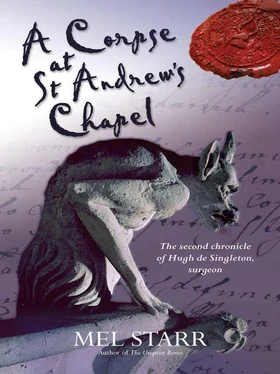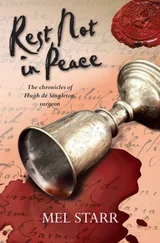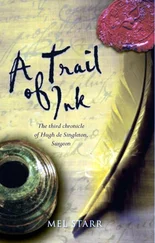Mel Starr - A Corpse at St Andrew's Chapel
Здесь есть возможность читать онлайн «Mel Starr - A Corpse at St Andrew's Chapel» весь текст электронной книги совершенно бесплатно (целиком полную версию без сокращений). В некоторых случаях можно слушать аудио, скачать через торрент в формате fb2 и присутствует краткое содержание. Год выпуска: 2010, Издательство: Kregel Publications, Жанр: Исторический детектив, на английском языке. Описание произведения, (предисловие) а так же отзывы посетителей доступны на портале библиотеки ЛибКат.
- Название:A Corpse at St Andrew's Chapel
- Автор:
- Издательство:Kregel Publications
- Жанр:
- Год:2010
- ISBN:нет данных
- Рейтинг книги:5 / 5. Голосов: 1
-
Избранное:Добавить в избранное
- Отзывы:
-
Ваша оценка:
- 100
- 1
- 2
- 3
- 4
- 5
A Corpse at St Andrew's Chapel: краткое содержание, описание и аннотация
Предлагаем к чтению аннотацию, описание, краткое содержание или предисловие (зависит от того, что написал сам автор книги «A Corpse at St Andrew's Chapel»). Если вы не нашли необходимую информацию о книге — напишите в комментариях, мы постараемся отыскать её.
A Corpse at St Andrew's Chapel — читать онлайн бесплатно полную книгу (весь текст) целиком
Ниже представлен текст книги, разбитый по страницам. Система сохранения места последней прочитанной страницы, позволяет с удобством читать онлайн бесплатно книгу «A Corpse at St Andrew's Chapel», без необходимости каждый раз заново искать на чём Вы остановились. Поставьте закладку, и сможете в любой момент перейти на страницу, на которой закончили чтение.
Интервал:
Закладка:
I enlarged my search and with the stick I turned over matted leaves and prodded at the vines and scrub between the place where Henry was found and the road. Shortly after the Bell of St Beornwald’s Church announced the ninth hour I found, midway between the road and the trampled ground, the shaft of an arrow.
This arrow was incomplete. There was no point affixed to the shaft. Where the point once was I could see a splintered end and the hole where a pin had held point to shaft. The arrow was clean and unmarked by the rot which soon overtakes wood in such a damp, shaded place. The arrow was carefully notched, and the goose feathers set into the shaft were skillfully split and placed.
I searched the forest for another hour, until shadows were long across the grove, but detected no other object there by the hand of man. The iron point of the arrow was not to be found.
There was no reason for an arrow to be in Lord Gilbert’s forest. Henry atte Bridge was struck down by a small dagger. I saw the wound. And the place was too close to the town for a poacher to feel safe taking one of Lord Gilbert’s deer. I discarded the stick as I pushed my way from the forest fringe to the road, and re-examined the arrow as I walked back to the castle.
Bampton had but one fletcher, and since the Treaty of Bretigny the town could not supply him with enough business to keep his children fed. What does a man need arrows for if he cannot discharge them at another? Some were needed for practice — which reminded me again that I needed to resume Sunday afternoon archery trials in the castle forecourt — but arrows loosed at targets may be retrieved and reused. So I did not expect Martin the fletcher to be at his craft when I approached his house on the Broad Street. He was not. His wife directed me to the south of town where, near Shill Brook, I found him finishing the seeding of a bean field.
The fletcher swung his dibble stick to his shoulder and studied me as I approached. I was careful to step between his planted rows, but my appearance did not seem to bring the man any pleasure for all my caution. The approach of a lord’s bailiff has generally that effect. Tenants and villeins know that if a reeve or bailiff seek them out it will concern some trouble which will require their assistance. So I was not surprised when the fletcher observed me across his field with narrowed, cautious eyes and lips drawn thin.
I held the broken arrow before me for the fletcher’s inspection and asked if the object was his work. His response was quick.
“Nay…not of mine.”
“You are certain?”
“Aye. ’Tis well made, but not my work. See here,” he took the arrow from my hand and held it up before my eyes, “the feathers be from a goose. A wild goose, I think. I use feathers from Lord Gilbert’s tame geese. The poulterer saves ’em for me. They be mostly white, not grey, as these.” He tapped the fletching. “But ’tis good work. I’d be proud to call it my own.”
I thanked the fletcher for his answer and saw relief soften the lines of his broad face. His mouth moved as if he would speak, but as quickly clamped shut. Much curiosity may bring distress, as the commons know. The man held his tongue.
Another question came to me as I turned to leave the bean field. “This arrow is well done, you say. Do you know the work?”
The fletcher took the shaft from me once again and studied it intently. I think he pondered the effect of his answer as well as the workmanship. After a close inspection he raised his eyes to mine.
“Nay…’tis not possible to tell. ’Tis much like the arrows foresters and yeomen make for their own use. ’Tis of alder, not ash, so ’twas made, I think, for practice. Ash would not have broken so.”
“A skillful yeoman?”
“Aye. Whoso made this has much practice. ’Tis nearly as good as mine. See how straight is the shaft.” He held the arrow to his eye and peered down its length. “And the fletching is neatly done. This arrow will fly true.”
A well-made arrow, broken, lying in the leaves of Lord Gilbert’s forest close by the town and near to the place a lifeless body was found. I puzzled over this as I left the fletcher to his bean field and made my way back to the town.
The sun was low over the rooftops and bright in my eyes as I walked down Bridge Street toward the mill and castle. Before I had reached the bridge over Shill Brook I determined to resume archery competition the next Sunday. I would, at that event, make close inspection of arrows loosed at the butts to see if any resembled the shaft in my hand. This resolution cleared my mind, as did the flowing waters of the brook. I stopped on the bridge to watch the stream flow below me. The world might be a baffling place, full of wonder and discouragement, but the brook flowed on unchanging and predictable. God’s constant in a mutable world. But for my growling stomach warning me that I might miss my supper, I would have remained longer at the bridge, enjoying the calming brook.
The weather had much improved this day. There was yet light when the evening meal was done, so while grooms dismounted tables and moved benches aside in the hall I walked the parapet. Circumnavigating Lord Gilbert’s castle would not find for me evidence of a murderer, but might provide time to order what I knew already — which was little enough.
The castle shadow stretched long to the east. Indeed, the mill was now shaded and the shadow of the southeast tower darkened Shill Brook and the bridge. Beyond the bridge I watched a figure approach. It was Hubert Shillside’s gangly son, all knees and elbows and splayed feet as he strode resolutely toward the castle. I paid him no mind, but continued my stroll to the northeast tower, then to the northwest. From that elevated corner I could look south along the west wall and the gatehouse.
I saw there the Shillside youth again, lounging against a small tree some twenty paces from the portcullis. As I watched his attention was drawn to the gatehouse and he stood stiffly from the sapling.
The object of his attention slipped through the gatehouse door toward the darkness under the tree. Alice. I watched the two stand in shadowed conversation, then Alice turned back to the gatehouse. Wilfred was about to close the gate and drop the portcullis. She turned back to the youth for another word, then flitted from tree to castle and was gone from sight. I remained atop the northwest tower and watched the coroner’s boy lope happily back to Mill Street and off to the darkened town.
There were yet four days before Sunday to announce another season of archery competition. I told as many as I met, advised castle servants to do likewise, and for those few who could read I posted a notice at the door of St Beornwald’s Church.
Thursday of that week was May Day and as always it was celebrated with joy and foolishness. I heard castle residents awake and about before dawn, and before the third hour these youth, Alice atte Bridge among them, returned to the castle laden with blossoms from flowering trees and green sprigs of hawthorn — but without the flowers, for all know it courts misfortune to bring the blossom of the holy thorn into a house.
They erected a maypole before the castle gatehouse and maidens of the town danced around it. Alice, in grace and comeliness, put the others to shame. No doubt Will Shillside thought the same.
On Saturday I purchased a cask of fresh ale from the baker’s wife and drew from the castle storeroom three targets used the previous year. From the castle strongbox, which in the absence of Lord Gilbert I kept in my chamber, I took five silver pennies for prizes and was ready for the competition.
There is joy in resuming a pleasurable activity which one has been compelled to abandon. Add to that sentiment the delights of a warm spring afternoon and you will understand why the resumption of archery competition was a success — for all of Bampton but me.
Читать дальшеИнтервал:
Закладка:
Похожие книги на «A Corpse at St Andrew's Chapel»
Представляем Вашему вниманию похожие книги на «A Corpse at St Andrew's Chapel» списком для выбора. Мы отобрали схожую по названию и смыслу литературу в надежде предоставить читателям больше вариантов отыскать новые, интересные, ещё непрочитанные произведения.
Обсуждение, отзывы о книге «A Corpse at St Andrew's Chapel» и просто собственные мнения читателей. Оставьте ваши комментарии, напишите, что Вы думаете о произведении, его смысле или главных героях. Укажите что конкретно понравилось, а что нет, и почему Вы так считаете.












